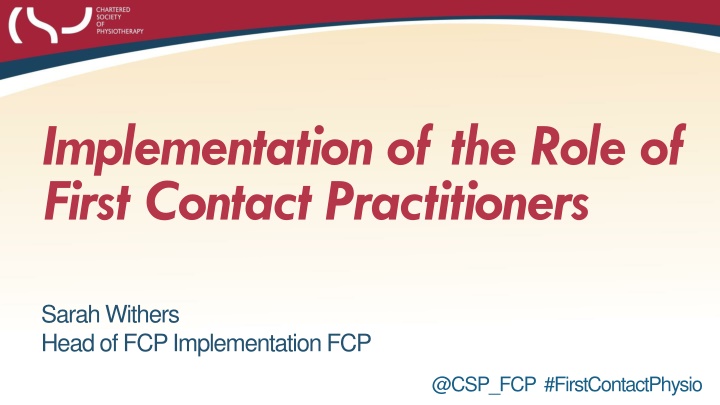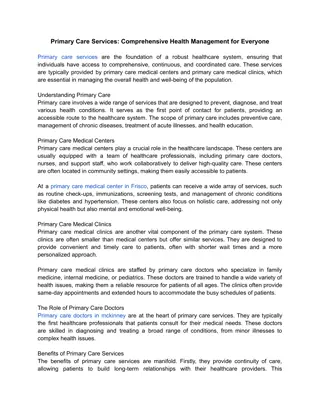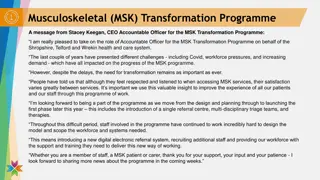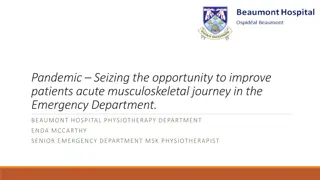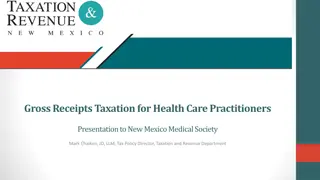Implementation of First Contact Practitioners in MSK within Primary Care Teams
Sarah Withers, Head of FCP Implementation at CSP_FCP, is leading the charge in implementing First Contact Practitioners (FCPs) within Primary Care Teams to provide quicker access to MSK expertise, referrals, treatments, and tests. FCPs offer benefits for patients, such as safe, efficient care and improved self-management programs. The support for the FCP model is strong among both patients and GPs, with positive impacts on the local healthcare system's efficiency and effectiveness. The NHS England evaluation in 2018 highlighted the success and potential of FCP services in long-term healthcare planning.
Download Presentation

Please find below an Image/Link to download the presentation.
The content on the website is provided AS IS for your information and personal use only. It may not be sold, licensed, or shared on other websites without obtaining consent from the author.If you encounter any issues during the download, it is possible that the publisher has removed the file from their server.
You are allowed to download the files provided on this website for personal or commercial use, subject to the condition that they are used lawfully. All files are the property of their respective owners.
The content on the website is provided AS IS for your information and personal use only. It may not be sold, licensed, or shared on other websites without obtaining consent from the author.
E N D
Presentation Transcript
Implementation of the Role of First Contact Practitioners Sarah Withers Head of FCP Implementation FCP @CSP_FCP #FirstContactPhysio
FCPs in MSK in MSK within the Primary Care team:what does this approach deliver? Assess and diagnose (including screening for serious pathology) Refer to a course of treatment (e.g. physiotherapy) Refer to a secondary care service Request investigations Medicines optimization Administer joint / soft tissue injections (if qualified). Potential interventions: Give info on self-care and enable and support behavior change Discuss fitness for work Undertake social prescribing Discuss physical activity and health so fewer steps and on the right path from the start In one session First Contact Physiotherapist will Person presenting with a MSK condition is booked in to see an FCP by the GP receptionist
Benefits of FCP For patients Safe, efficient and effective Quicker access to MSK expertise referral to other services and tests (if needed) Quick access to treatment, tests and specialists if needed Improved delivery of healthy living message patient self-care through supporting of self- management programmes and social prescribing patient experience Quick access to advice and information to start improvement
Support Support 73 73% % of people said they would see a physio instead of a GP for back or neck pain 85% 85% of GPs agree with the FCP model
Benefits of FCP to the local healthcare system For the healthcare system Safe, efficient and effective Fewer inappropriate MRIs & X-rays inappropriate secondary care referrals re-referrals for the same condition Shorter waiting times for tests, appointments, and surgery More GP appointments available for others Improved conversion rates to surgery Reduced prescribing rates and costs
NHS England evaluation NHS England evaluation Summer 2018: 41 out of 42 STPs put forward an existing or new FCP service for evaluation. Cited in Long Term Plan in 2019. Consists of: Local context questionnaire (re: services funding, governance, staffing, providers) FCP appointment data captured on practices clinical data systems Experiences of patients (including PROMs and PREMs), GPs and physiotherapists
NHS England evaluation NHS England evaluation The results from the 2018/19 evaluation of FCP in England (involving over 40 services) will be published this autumn. It is expected to include over 50,000+ FCP consultations. 97% of patients questioned would recommend the service FCP patients received 10% fewer blood tests compared to GP patients 99% of patients had complete confidence in the FCP s competency interim findings 74% of patients received advice from the FCP (compared to 4% of GP patients) FCPs wrote 12% fewer drug prescriptions than GPs Referrals to orthopaedics significantly reduced
A five year framework for GP contract reform (published January 2019) In 2020, first contact physiotherapists (at Bands 7 and 8a) will be eligible for 70% reimbursement from the Additional Roles Reimbursement Scheme By 2024, the new Scheme is expected to have created 20,000+ new posts in general practices, with an average PCN having access to 3 FCPs, 5 clinical pharmacists, 3 link workers, 2 physicians associates and 1 community paramedic(with flexibility for PCNs to determine the staff mix)
Elective Care High Impact Interventions: FCP for MSK Services Specification (published May 2019) In 2019/20: STPs are required to select at least two further sites/network of GP practices (circa 50k population) to add to the 2018/19 cohort and establish FCP services in the selected sites. This implementation plan builds on sites mobilised during 2018/19 and on local and national evidence base bit.ly/30GY3NA
Resources @ csp.org.uk/ Resources @ csp.org.uk/fcp fcp Implementation guidance for FCPs Data collection guidance (and templates for Emis, SystmOne & Vision) Job description information Videos of FCP services (from HEE) Calculator for estimating potential savings of FCP Frequently Asked Questions on FCP Case studies at innovations.csp.org.uk Join the FCP forum at www.csp.org.uk/icsp/fcp or email fcp@csp.org.uk
The FCP workforce for 2020 + beyond The FCP workforce for 2020 + beyond Full roll out dependent on expansion of FCP posts First wave of FCPs = existing advanced practice roles in MSK community & triage services. NHSE s Long Term Plan and GP contract framework commits to this At present: around 9,000 physios at B7+ are employed by NHS providers in England 1 FCP (WTE) per 10k population Physiotherapy is growing: 40% more graduate education places since 2015
Solutions to meet the needs MSK Core Capabilities Framework: for self-,peer- and employer-based assessment > skillsforhealth.org.uk Master s modules on FCP (either standalone or as part of MSc courses) E-learning: free modules on FCP related areas and on Person Centred Approaches > e-lfh.org.uk Mentoring: fromwithinthewider MSK service and/or the primary care team
Communicating to local systems Communicating to local systems Later this autumn, NHSE will publish findings from the national FCP evaluation with an accompanying media campaign. This is an opportunity to: share local findings raise the profile of FCP and its benefits to the wider system address misconceptions
The CSPs priorities on FCP: The CSP s priorities on FCP: Supporting FCP implementation Developing workforce Leading on evaluation (at national and local levels) Working with Higher Education Institutes on workforce development Providing resources Enabling peer support Informing and influencing public policy
@CSP_FCP #FirstContactPhysio @CSP_FCP #FirstContactPhysio
